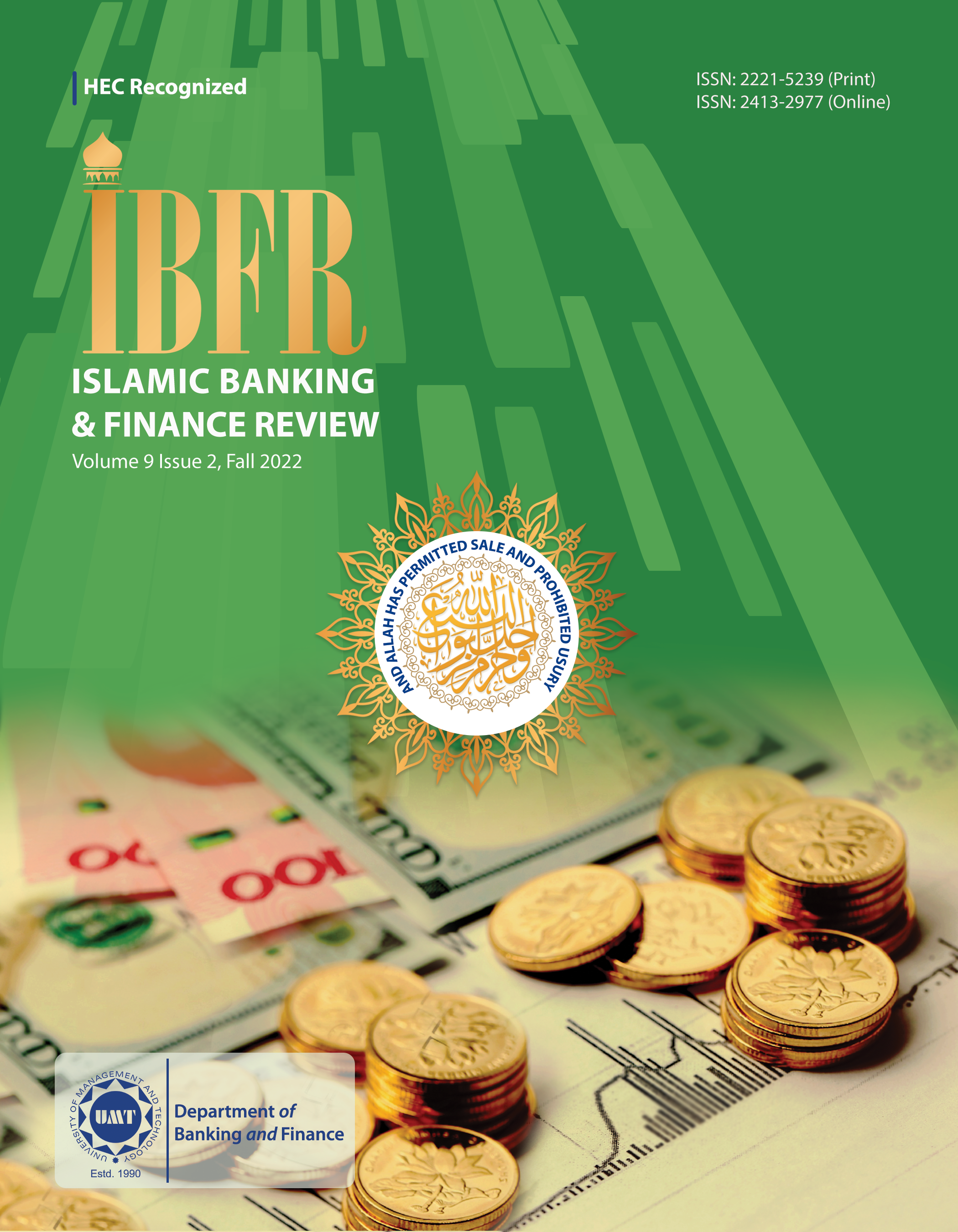Role of Shariah Supervisory Boards (SSBs) in Islamic Financial Engineering: A Critical Review
A Critical Review
Abstract
 Abstract Views: 70
Abstract Views: 70
This paper aims to review critically the role of SSBs in Islamic financial engineering. In addition, this paper tries to explore different similarities between SSBs’ and BODs’ roles. It has been found, on the basis of content analysis, that the different roles of a SSB, such as a legislator, consultant/advisor, and auditor, are pivotal in Islamic financial engineering for improving the efficiency of Islamic financial markets. Moreover, different similarities in the roles of SSBs and BODs have been found but to a narrower extent, since SSBs monitor and control the religious side of IFIs. This paper proposes, to incorporate SSBs within the CG structure of two-tier boards, that SSB might be considered as the supervisory board, whereas, the regular BOD needs to be considered as the management board.
Downloads
References
AAOIFI. (2022b). AAOIFI GS 2–Shariah Review. Retrieved August 13, 2022, from http://aaoifi.com/aaoifi-gs-2-sharia-review/?lang=en
Abbas, S. (2015). Islamic Financial Engineering: A Critical Investigation into Product Development Process in the Islamic Financial Industry. Durham theses, Durham University.
Ahmed, E. R., Islam, M. A., & Zuqibeh, A. (2013). The Role of Shariah Supervisory Board in the Reviewing and Supervision on Takaful (Islamic Insurance). Insurance and Takaful Journal.
Akhter-Uddin, M., & Ahmad, A. U. F. (2020). Conventional Futures: Derivatives in Islamic Law of Contract. International Journal of Law and Management, 62(4), 315–337.
Alam, M. K., Ab-Rahman, S., Tabash, M. I., Thakur, O. A., & Hosen, S. (2021). Shariah Supervisory Boards of Islamic Banks in Bangladesh: Expected Duties and Performed Roles and Functions. Journal of Islamic Accounting and Business Research, 12(2), 258–275.
Al-Amer, S. A. (2018). Sharia Supervisory Board in Islamic Banks: A Critical Analysis of the Current Framework. Doctoral dissertation, University of Leeds.
Al-Dohni, A. K. (2008). Islamic Banking In the United Kingdom: Is the Current Legal and Regulatory Framework Capable of Hosting an Islamic Banking Sector? Doctoral dissertation, University of Leeds.
Al-Khamees, A. (2017). A Critique of Creative Shariah Compliance in the Islamic Finance Industry. Brill.
Al-Khelaifi, R. (2003). The General Theory for Shariah Supervisory Boards. Proceedings of the Third Annual Conference of AAOIFI, 1–74.
Al-Nasser, S. A. S., & Muhammed, J. (2012). Introduction to Corporate Governance from Islamic Perspective. Humanomics, 28(3), 220–231.
Al-Suwailem, S. (2007). Financial Engineering: An Islamic Perspective. Sinergi, 9(1), 87–102.
Al-Suwailem, S., & Hassan, M. K. (2011). An Islamic Perspective of Financial Engineering. In M. K. Hassan, & M. Mahlknecht (Eds.), Islamic Capital Markets: Products and Strategies (pp. 385–400). John Wiley & Sons, Ltd.
Anwer, Z., & Habib, F. (2019). Re-visiting Current Debate on Shariah Position of Derivatives. Journal of Islamic Business and Management, 9(1), 64–83.
Aribi, Z. A., Arun, T., & Gao, S. (2019). Accountability in Islamic Financial institution: The Role of the Shariah Supervisory Board Reports. Journal of Islamic Accounting and Business Research, 10(1), 98–114.
Askari, H., & Iqbal, Z. (2013). Opportunities in Emerging Islamic Financial Markets. PSL Quarterly Review, 48(194), 255-282.
Ayub, M. (2019). Strengths, Gaps, and Issues in Shariah Governance Framework 2015 for IBIs in Pakistan. In T. Azid, A. A. Alnodel, & M. A. Qureshi (Eds.), Research in Corporate and Shariah Governance in the Muslim World: Theory and Practice (pp. 261–275). Emerald Publishing Limited.
Ayub, M. (2007). Understanding Islamic Finance. John Wiley & Sons.
Ayub, M. (2003). Derivatives and Islamic Finance. Retrieved August 2, 2022, from https://www.sbp.org.pk/departments/ibd/derivatives_islamic.pdf.
Butt, S. A. (2016). Corporate Governance for Pakistan: Text & Cases (5th ed.). Azeem Academy.
Cadbury Report. (1992, December). Report of the Committee on the Financial Aspects of Corporate Governance. Gee and Co. Ltd.
Chance, D. M., & Brooks, R. (2015). Introduction to Derivatives and Risk Management (10th ed.). Cengage Learning.
Choudhury, M. A., & Hoque, M. Z. (2006). Corporate Governance in Islamic Perspective. Corporate Governance, 6(2), 116–128.
Donaldson, L., & Davis, J. H. (1991). Stewardship Theory or Agency Theory: CEO Governance and Shareholder Returns. Australian Journal of Management, 16(1), 49–64.
Fatmawati, D., Ariffin, N. M., Abidin, N. H. Z., & Osman, A. Z. (2022). Shariah Governance in Islamic Banks: Practices, Practitioners and Praxis. Global Finance Journal, 51, 100555.
Finnerty, J. D. (1988). Financial Engineering in Corporate Finance: An Overview. Financial Management, 17(4), 14–33.
Fligstein, N., & Freeland, R. (1995). Theoretical and Comparative Perspectives on Corporate Organization. Annual Review of Sociology, 21(1), 21–43.
Garas, S. N., & Pierce, C. (2010). Shariah Supervision of Islamic Financial Institutions. Journal of Financial Regulation and Compliance, 18(4), 386–407.
Ginena, K. (2014). Shariah Risk and Corporate Governance of Islamic Banks. Corporate Governance, 14(1), 86–103.
Grais, W., & Pellegrini, M. (2006, October). Corporate Governance In Institutions Offering Islamic Financial Services: Issues and Options (Policy Research Working Paper). World Bank Group. https://elibrary.worldbank.org/doi/abs/10.1596/1813-9450-4052.
Hamid, A., & Ginena, K. (2015). Foundations of Shariah Governance of Islamic Banks. Wiley.
IFSB. (2009, December). Guiding Principles on Shariah Governance Systems for Institutions Offering Islamic Financial Services. Islamic Financial Services Board.
Iqbal, Z. (1999). Financial Engineering in Islamic Finance. Thunderbird International Business Review, 41(4–5), 541–559.
Iqbal, Z., & Greuning, V. H. (2007). Risk Analysis for Islamic Banks. World Bank Publications.
Iqbal, Z., & Mirakhor, A. (2004). Stakeholders Model of Governance in Islamic Economic System. Islamic Economic Studies, 11(2), 43–63.
Iqbal, Z., & Lewis, M. K. (2009). An Islamic Perspective on Governance. Edward Elgar Publishing.
Johnson, J. L., Daily, C. M., & Ellstrand, A. E. (1996). Boards of Directors: A Review and Research Agenda. Journal of Management, 22(3), 409–438.
Kamali, M. H. (1999). Prospects for an Islamic Derivatives Market in Malaysia. Thunderbird International Business Review, 41(4–5), 523–540.
Keay, A. (2008). Ascertaining The Corporate Objective: An Entity Maximization and Sustainability Model. Modern Law Review, 71(5), 663–698.
Keay, A. (2010). Stakeholder Theory in Corporate Law: Has it Got What it Takes? Richmond Journal of Global Law & Business, 9(3), 249–300.
Letza, S., Sun, X., & Kirkbride, J. (2004). Shareholding versus Stakeholding: A Critical Review of Corporate Governance. Corporate Governance, 12(3), 242–262.
Malkawi, B. H. (2013). Shariah Board in the Governance Structure of Islamic Financial Institutions. The American Journal of Comparative Law, 61(3), 539–578.
Mansuri, M. T. (2022). Islamic Law of Contracts and Business Transactions. Adam Publishers & Distributors.
Mollah, S., & Zaman, M. (2015). Shari'ah Supervision, Corporate Governance, and Performance: Conventional vs. Islamic Banks. Journal of Banking and Finance, 58(1), 418–435.
Morrison, S. (2014). Shariah Boards and the Corporate Governance of Islamic Banks in the United Kingdom. Journal of Islamic Economics Banking and Finance, 10(1), 96–109.
Muneeza, A., & Hassan, R. (2014). Shariah Corporate Governance: The Need for a Special Governance Code. Corporate Governance, 14(1), 120–129.
Nathan, S., & Ribière, V. (2007). From Knowledge to Wisdom: The Case of Corporate Governance in Islamic Banking. VINE, 37(4), 471–483.
Nordberg, D. (2011). Corporate Governance: Principles and Issues (1st ed.). SAGE Publications Ltd.
Obid, S. N. S., & Naysary, B. (2014). Toward a Comprehensive Theoretical Framework for Shariah Governance in Islamic Financial Institutions. Journal of Financial Services Marketing, 19(4), 304–318.
OECD. (2004). OECD Principles of Corporate Governance. OECD Publications Service.
Safieddine, A. (2009). Islamic Financial Institutions and Corporate Governance: New Insights for Agency Theory. Corporate Governance: An International Review, 17(2), 142–158.
Saleem, M. Y. (2013). Islamic Commercial Law. John Wiley & Sons.
Saleh, N. A. (1992). Unlawful Gain and Legitimate Profit in Islamic Law. Graham & Trotman.
SBP. (2018, June). Shariah Governance Framework for Islamic Banking Institutions. Islamic Banking Department, State Bank of Pakistan.
Securities Commission Malaysia. (2020). Resolutions of the Shariah Advisory Council of the Securities Commission Malaysia. Securities Commission Malaysia.
Sheikh, R., & Khan, A. (2018). Liquidity Management Mechanisms of Islamic and Conventional Finance: A Shariah Appraisal. Policy Perspectives, 15(2), 1–24.
Shleifer, A., & Vishny, R. W. (1997). A Survey of Corporate Governance. The Journal of Finance, 52(2), 737–783.
Solomon, J. (2020). Corporate Governance and Accountability (5th ed.). John Wiley & Sons.
Sori, Z. M., Mohamad, S., & Shah, M. E. (2015). Shariah Committee Independence: An Insider’s View. INCEIF Quarterly Research Bulletin, 6, 1–8. https://papers.ssrn.com/sol3/papers.cfm?abstract_id=2576539
Trad, N., Trabelsi, M. A., & Goux, J. F. (2017). Risk and Profitability of Islamic Banks: A Religious Deception or an Alternative Solution? European Research on Management and Business Economics, 23(1), 40–45.
Usmani, M. T. (1996). Futures, Options, Swaps, and Equity Investments. New Horizon, 10–11.
Vogel, F. E., & Hayes, S. L. (1998). Islamic Law and Finance: Religion, Risk, and Return (1st ed.). Kluwer Law International.
Warde, I. (2010). Islamic Finance in the Global Economy (2nd ed.). Edinburgh University Press.
Zainal-Abidin, N. H., Mat-Yasin, F., & Zainal-Abidin, A. (2020). Independence from the Perspective of the Shariah Committee. Asian Journal of Accounting Research, 6(2), 196–209.
Copyright (c) 2022 Rafiullah Sheikh, Khald Hussain

This work is licensed under a Creative Commons Attribution 4.0 International License.
Authors retain copyright and grant the journal right of first publication with the work simultaneously licensed under a Creative Commons Attribution (CC-BY) 4.0 License that allows others to share the work with an acknowledgement of the work’s authorship and initial publication in this journal.












